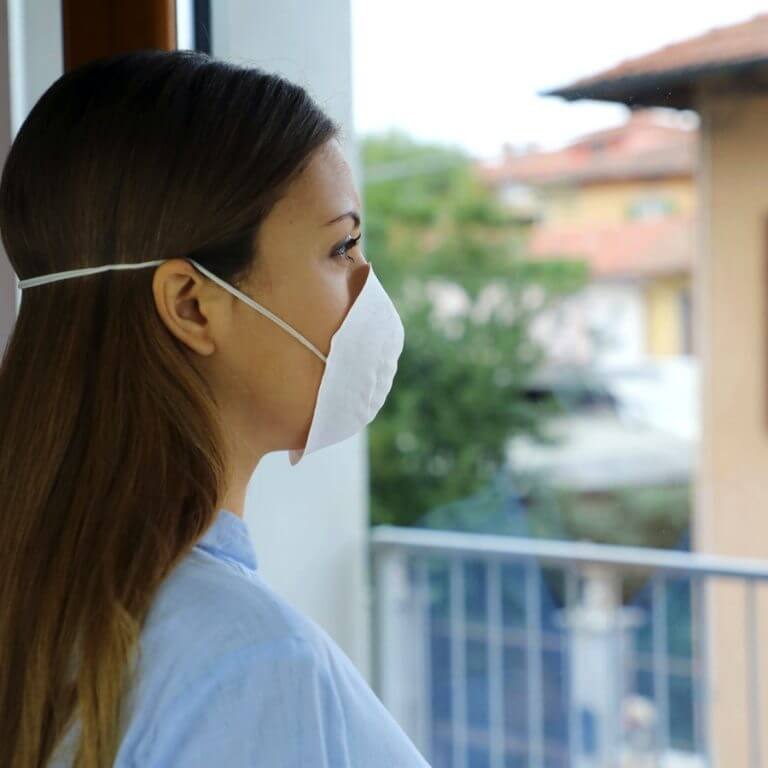1
00:00:03,210 –> 00:00:05,090
Foi durante a quarentena,
{{It was during the quarantine,}}
2
00:00:05,090 –> 00:00:08,890
que se iniciou no dia 18 de Março de 2020,
{{which began on March 18, 2020,}}
3
00:00:08,890 –> 00:00:13,250
que tive a oportunidade de conhecer melhor os meus vizinhos.
{{that I had the chance to get to know my neighbours better.}}
4
00:00:13,250 –> 00:00:17,090
Moro há 5 anos num prédio de 50 apartamentos,
{{I’ve lived in a building of 50 apartments for five years,}}
5
00:00:17,090 –> 00:00:20,070
na zona do Parque das Nações, em Lisboa,
{{in the area of Parque das Nações in Lisbon,}}
6
00:00:20,070 –> 00:00:25,770
e nunca havia trocado mais do que um “bom dia” ou “boa noite”
{{and I had never exchanged more than a “good morning” or “good night”}}
7
00:00:25,770 –> 00:00:29,170
com quem me cruzava nas zonas comuns…
{{with those who crossed [paths with] me in the common areas…}}
8
00:00:29,170 –> 00:00:32,290
Sabem como é a vida agitada nas grandes cidades –
{{You know how hectic life is in big cities –}}
9
00:00:32,290 –> 00:00:35,640
de manhã, corremos para poder dormir ao máximo
{{in the morning, we rush so we can get as much sleep as possible}}
10
00:00:35,640 –> 00:00:38,250
mas não chegar tarde ao trabalho;
{{but not arrive late to work;}}
11
00:00:38,250 –> 00:00:39,770
ao final da tarde,
{{at the end of the afternoon,}}
12
00:00:39,770 –> 00:00:43,830
só queremos fugir para o conforto da nossa casa.
{{we just want to escape to the comfort of our home.}}
13
00:00:43,830 –> 00:00:50,790
Mal sabíamos que este iria ser um dos poucos espaços fechados que poderíamos frequentar!
{{We hardly knew that this would be one of the few closed spaces we could frequent!}}
14
00:00:50,790 –> 00:00:53,870
A onda de solidariedade no prédio
{{The wave of solidarity in the building}}
15
00:00:53,870 –> 00:00:58,130
começou no dia 20 de Março quando o vizinho do quarto E,
{{started on March 20th when the neighbour from room E,}}
16
00:00:58,130 –> 00:01:01,929
Pedro de 36 anos e dono de dois gatos,
{{Pedro, 36 years old and owner of two cats,}}
17
00:01:01,930 –> 00:01:04,710
que trabalha numa clínica dentária,
{{who works in a dental clinic,}}
18
00:01:04,710 –> 00:01:08,910
deixou uma caixa de máscaras descartáveis à entrada.
{{left a box of disposable masks at the entrance.}}
19
00:01:08,910 –> 00:01:14,210
Deixou também um bilhete para nos informar sobre o uso correto das mesmas
{{He also left a note to inform us about their correct use}}
20
00:01:14,210 –> 00:01:18,470
e que as máscaras devem ser, preferencialmente, usadas
{{and that the masks should be worn, preferably,}}
21
00:01:18,470 –> 00:01:21,389
por quem tenha sintomas de infecção.
{{by anyone with symptoms of infection.}}
22
00:01:21,390 –> 00:01:25,090
No dia seguinte, a Joana de 16 anos,
{{The following day, 16-year-old Joana,}}
23
00:01:25,090 –> 00:01:28,730
filha do Carlos e da Marisa que moram no 10ºB
{{daughter of Carlos and Marisa who live in 10ºB,}}
24
00:01:28,730 –> 00:01:33,330
arranjou um incrível sistema para utilizar o elevador
{{set up an incredible system to use the elevator}}
25
00:01:33,330 –> 00:01:37,290
sem que tenhamos de tocar nos botões diretamente.
{{without us having to touch the buttons directly.}}
26
00:01:37,290 –> 00:01:40,870
Consiste numa esponja colada em todos os andares
{{It consists of a sponge glued on every floor}}
27
00:01:40,870 –> 00:01:45,209
e dentro de cada elevador onde estão espetados vários palitos.
{{and inside each elevator where several sticks are stuck.}}
28
00:01:45,210 –> 00:01:49,150
Dentro do elevador, existe também uma caixinha
{{Inside the elevator, there is also a little box}}
29
00:01:49,150 –> 00:01:51,350
para que os possamos descartar
{{so that we can discard them}}
30
00:01:51,350 –> 00:01:54,710
após os termos usado para carregar nos botões.
{{after we’ve used them to push the buttons.}}
31
00:01:54,710 –> 00:01:57,450
Tudo isto acompanhado de pictogramas
{{All this accompanied by pictograms}}
32
00:01:57,450 –> 00:02:01,690
feitos pela irmã mais nova, a Catarina de 8 anos.
{{made by her younger sister, 8-year-old Catherine.}}
33
00:02:01,690 –> 00:02:05,410
Sempre achei aquelas miúdas muito despachadas!
{{I always thought those girls were very resourceful!}}
 We respect your privacy and have a ZERO TOLERANCE for spam.
We respect your privacy and have a ZERO TOLERANCE for spam.
















Excelente. Realmente muito interessante. A voz é bonita e justa além disso. Muito obrigada a toda a equipe por esta linda mensagem. Em uma situação de crise, alguns mostram sua baixeza ainda melhor, enquanto outros mostram a sua própria grandeza. É essa grandeza que faz a beleza da vida.
Se você tiver tempo, ficaria muito grata se você pudesse corrigir meus erros mais importantes. Eu sei que os erros são ótimos professores. Eles não me assustam, são os meus amigos que me ajudam a aprender :).
Desejo-lhe o melhor possível, Cuide-se. Até breve .=)
Obrigado pela bonita mensagem, e muito bem escrita! Não há praticamente nada a corrigir, senão a escolha da palavra ‘justa’ que me parece uma tradução muito direta da palavra francesa juste 🙂 Em português, é mais provável dizermos que é uma voz ‘afinada’, ‘limpa’ ou ‘bem colocada’, por exemplo.
Aproveito a oportunidade para te recomendar o nosso fórum, onde alguns membros participam regularmente em português e também aproveitam para receber correções: Fórum Practice Portuguese
I have queries Joseph , que se iniciou, que se means ‘”which”? Que trabalhar , que means “who” here? Para que os passamos? Os means “them’?
após os termos usado? Os means them again, does os always mean them before a verb? Muito confusão, Alan.
Olá, Alan. “Que” is a veeery versatile word with several different uses and possible meanings. You really have to look at the full context whenever you come across this word, or you’ll be confused a lot of the time.
In those two cases you pointed out (“que se iniciou” and “que trabalha”), “que” is working as a relative pronoun, so it’s always linking back to the subject that appeared just before. In “que se iniciou”, “que” is replacing “quarentena”, so it translates to “which”. In “que trabalha”, “que” is replacing “Pedro”, so it translates to “who”. You also see the word “que” translated as “that” several times throughout the rest of the Shorty.
Regarding “os”, yes, most times (but not always) it means “them” when it comes before a verb, because it’s working as a direct object pronoun. These two Learning Notes might help:
– Introduction to Clitic Pronouns
– Clitic Pronouns: 3rd Person
Finally, going back to “que se iniciou”, I just wanted to point out that the little word “se” is a reflexive pronoun, as if you were saying that the quarantine started itself. This is because in Portuguese, the verb iniciar (to start) usually applies to one person or thing starting something else. For example, “O professor inicia a aula” (The teacher starts the class). In this case, it’s like you were saying “A quarentena iniciou a quarentena” (The quarantine started the quarantine). Since it’s circling back to itself, this becomes “A quarentena iniciou-se” (The quarantine started itself). That’s where the “se” comes from.
More on reflexive pronouns here: Reflexive Pronouns
This is a LOT of information to take in! So take your time and just go through one topic at a time, if it helps 🙂
Olá! Na última frase, porque é que usa-se “achei” em vez de “acho”? A autora não acha assim agora?
Olá, Hana. Neste caso, ela diz “sempre achei” porque quer dizer que já tem essa opinião desde o passado. Pelo contexto, percebe-se que essa opinião continua válida agora 🙂
I don’t understand the following paragraph from 01:37 to 01:54:
“Consiste numa esponja colada em todos os andares e dentro de cada elevador onde estão espetados vários palitos. Dentro do elevador, existe também uma caixinha para que os possamos descartar após os termos usado para carregar nos botões.”
Translation:
“It consists of a sponge glued on every floor and inside each elevator where several sticks are stuck. Inside the elevator, there is also a little box so that we can discard them after we’ve used them to push the buttons.”
What I mean is I have difficulty imagining how this system works in actions. English is my third language so I still couldn’t understand it even after I looked at the English translation. Can you explain the system step-by-step?
Olá! Maybe this will help:
1. A sponge is glued in the elevator and also on every floor of the building.
2. Several sticks (like toothpicks) are inserted into the sponge.
3. People can take a stick from the sponge to press the elevator buttons on each floor and inside the elevator itself, avoiding direct contact with their fingers.
4. After using the stick to press the buttons, there’s a small box inside the elevator where the used sticks can be discarded.
There were some very creative solutions to minimize physical contact during the height of the pandemic. Consistent hand washing/sanitizing seems more practical 🙂
Your explanation is intuitive. Thanks!